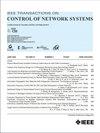A Decentralized Market Mechanism for Energy Communities Under Operating Envelopes
IF 4
3区 计算机科学
Q2 AUTOMATION & CONTROL SYSTEMS
引用次数: 0
Abstract
We propose an operating envelopes (OEs) aware energy community market mechanism that dynamically charges/rewards its members based on two-part pricing. The OEs are imposed exogenously by a regulated distribution system operator (DSO) on the energy community's revenue meter and are subject to a generalized net energy metering tariff design. By formulating the interaction of the community operator and its members as a Stackelberg game, we show that the proposed two-part pricing achieves a Nash equilibrium and maximizes the community's social welfare in a decentralized fashion while ensuring that the community's operation abides by the OEs. The market mechanism conforms with the cost-causation principle and guarantees community members a surplus level no less than their maximum surplus when they autonomously face the DSO. The dynamic and uniform community price is a monotonically decreasing function of the community's aggregate renewable generation. We also analyze the impact of exogenous parameters, such as NEM rates and OEs, on the value of joining the community. Lastly, through numerical studies, we showcase the community's welfare and pricing, and compare its members' surplus to customers under the DSO's regime.运行信封下的分散式能源社区市场机制
我们提出了一种可感知运行封套(OEs)的能源社区市场机制,该机制基于两部分定价对其成员进行动态收费/奖励。OEs 由受监管的配电系统运营商 (DSO) 在能源社区的收入计量表上外生施加,并受制于广义净能源计量电价设计。通过将社区运营商与社区成员之间的互动设定为斯塔克尔伯格博弈,我们证明了所建议的两部分定价能够实现纳什均衡,并以分散的方式实现社区社会福利的最大化,同时确保社区的运营遵守OEs。市场机制符合成本因果原则,保证了社区成员在自主面对 DSO 时的盈余水平不低于其最大盈余。动态统一的社区价格是社区可再生能源总发电量的单调递减函数。我们还分析了外生参数(如 NEM 费率和 OE)对加入社区价值的影响。最后,通过数值研究,我们展示了社区的福利和定价,并将其成员的盈余与 DSO 制度下的客户进行了比较。
本文章由计算机程序翻译,如有差异,请以英文原文为准。
求助全文
约1分钟内获得全文
求助全文
来源期刊

IEEE Transactions on Control of Network Systems
Mathematics-Control and Optimization
CiteScore
7.80
自引率
7.10%
发文量
169
期刊介绍:
The IEEE Transactions on Control of Network Systems is committed to the timely publication of high-impact papers at the intersection of control systems and network science. In particular, the journal addresses research on the analysis, design and implementation of networked control systems, as well as control over networks. Relevant work includes the full spectrum from basic research on control systems to the design of engineering solutions for automatic control of, and over, networks. The topics covered by this journal include: Coordinated control and estimation over networks, Control and computation over sensor networks, Control under communication constraints, Control and performance analysis issues that arise in the dynamics of networks used in application areas such as communications, computers, transportation, manufacturing, Web ranking and aggregation, social networks, biology, power systems, economics, Synchronization of activities across a controlled network, Stability analysis of controlled networks, Analysis of networks as hybrid dynamical systems.
 求助内容:
求助内容: 应助结果提醒方式:
应助结果提醒方式:


